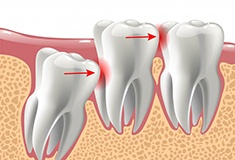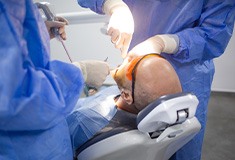
Wisdom Tooth Extraction – Forest, VA
Find Relief from Your Troubled Wisdom Teeth
The wisdom teeth typically begin to emerge in a person’s late teens or early twenties, and many people do not have enough room to accommodate them when they erupt. This can lead to a wide range of oral health issues such as a loss of dental alignment and destructive oral infections. Here’s a brief guide to wisdom tooth extractions at our office in Forest, but please contact our staff if you wish to know more.
Why Choose Crossroads Family Dentistry for Wisdom Tooth Extraction?
- Skilled and Compassionate Dental Team
- Insurance Welcomed
- Financing Options Available
What are Wisdom Teeth?

The wisdom teeth are the third set of molars and the last teeth to emerge over the course of the mouth’s development. While these big, strong molars once played a crucial role in helping people chew tough plant matter and raw meat before cooking was invented, people today often do not have jawbones large enough to accommodate these teeth. Some people are born with only one, two, or three wisdom teeth, and a few individuals are born with none at all. While it is not always essential to remove these third molars, doing so is the best way for many patients to relieve chronic pain and prevent oral infections.
Why Do Wisdom Teeth Need to Be Removed?

Removing a person’s wisdom teeth is necessary if these molars pose a significant threat to their oral health in the long run. The wisdom teeth emerging when there is not enough room for them can lead to serious issues like crowding, chronic pain, impaction, infections or cysts forming around them, and jawbone erosion. You may need your wisdom teeth removed if you experience symptoms such as pain when chewing, stiffness of the jaw, facial swelling, bad breath, or difficulty opening the mouth.
What to Expect from the Wisdom Teeth Procedure

To perform a simple wisdom tooth extraction, one of our dentists will use a specialized device called an elevator to raise the troublesome tooth from its socket before grasping it with forceps and gently working it loose from its connective tissue. However, if the wisdom teeth fail to emerge properly, they become impacted, which makes them much more likely to become infected and requires surgical extraction to resolve. This procedure involves making a small incision in the gum tissue to access the wisdom tooth, which is a service we perform in-house.
Recovering from Wisdom Teeth Extraction

After you have your wisdom teeth removed, you may experience temporary side effects such as facial swelling and bleeding around the surgical areas. While recovering, it’s important to practice excellent oral hygiene that includes brushing and rinsing while taking special care to avoid disturbing the extraction site. You should also abstain from spitting or using a straw, as these actions cause shifting pressures in the mouth that can dislodge the clot forming over the surgical area, resulting in a painful condition called dry socket. It’s crucial to comply with any postoperative instructions we give you such as sticking to a soft diet and taking medications as prescribed. If you have any concerns while recovering, please contact our office.
Understanding the Cost of Wisdom Tooth Extractions

At Crossroads Family Dentistry, we know that the cost of your wisdom tooth extraction is a concern. This is why we strive to help you plan for this essential procedure by offering transparent pricing and financing options to take the strain off your wallet. Read more below to learn more about pricing for wisdom tooth extractions and how we aim to make your care as affordable as possible. Then, reach out to us to schedule your consultation so we can offer you an accurate cost analysis.
Factors That Can Impact the Cost of Wisdom Tooth Extractions

Several factors influence the cost of wisdom tooth extractions. Here are the main points we take into consideration at your consultation:
- Number of Teeth: The more teeth that need to be removed during the procedure, the longer the process will take, increasing its final price.
- Position and Impaction Level: Wisdom teeth that have fully erupted tend to be easier and less costly to extract. However, impacted teeth stuck beneath your gums or in your jawbone often require more complex surgery, making the procedure more costly.
- Who Does the Work: While we perform the vast majority of wisdom tooth extractions in-house, there may be rare occasions when we’ll need to refer you to a specialist. This could affect the final price of your treatment.
Once you come into our Forest office, our team will assess your wisdom teeth with a thorough examination and answer any questions you may have. Then we’ll put together a detailed estimate of your costs, allowing you to decide how you want to approach financing.
Does Dental Insurance Cover Wisdom Tooth Extractions?

Most dental insurance plans offer some coverage for wisdom tooth extractions, especially if the procedure is medically necessary due to pain or other dental complications. That being said, it’s always best to double-check your policy.
Coverage levels and limits can vary, so we recommend contacting your insurance provider or letting us do it for you. We’re happy to help you parse through your benefits and maximize your coverage to reduce your out-of-pocket costs!
Other Options for Making Wisdom Tooth Extractions Affordable

To make wisdom tooth extractions affordable, our practice offers an in-house membership plan, which provides discounts on many essential services. We also partner with CareCredit, allowing you to finance the procedure with flexible, low-interest monthly payments.
Our goal is to provide high-quality, affordable options that fit your budget. So, don’t hesitate to give us a call if you need clarification on anything you find confusing!
Wisdom Tooth Extractions FAQs
Why Are Wisdom Teeth Called That?
Since they often are more harmful than helpful, you might be wondering why your third set of molars are called “wisdom teeth.” The prevailing theory is that they earned the nickname because wisdom comes with age, and they typically make an appearance between the ages of 17 and 25.
Does Everyone Have Wisdom Teeth?
An article in the Dental Research Journal estimated that upwards of 37% of patients are missing at least one of their wisdom teeth. It is believed that genetics play a crucial role in whether or not a patient has a third set of molars. In other words, if your parents or grandparents never had wisdom teeth, you might not either!
How Should I Prepare for My Wisdom Tooth Extraction?
Prior to your procedure, our Forest dental team will answer any questions you have. They will also give you specific instructions, like arranging for someone to drive you to and from your appointment if you’re being sedated. Outside of that, there are some general recommendations we have, like purchasing OTC pain medication, not smoking, and wearing something comfortable.
Should Wisdom Teeth Be Removed If They Don’t Hurt?
If you aren’t in pain, having your wisdom teeth removed may not seem urgent. However, it’s possible for your third set of molars to become problematic in the near future. We want to remove them before you experience considerable pain, a severe infection has developed, or your surrounding teeth are negatively impacted.
How Soon Can I Eat After Wisdom Teeth Removal?
You need to wait until the numbing agent wears off (which usually takes a few hours). Once you regain full sensation, you can eat, but you need to stick to a liquid diet (without using a straw) at first. Then, you can transition to extremely soft foods, like mashed potatoes, vegetable soup, and oatmeal, always making sure to check the temperature beforehand. Around the 5-day mark, you’ll feel significantly better, and you can start incorporating the foods you usually eat back into your diet.
Are Wisdom Tooth Extractions Covered by Insurance?
Dental insurance providers typically cover a portion of the cost of medically necessary treatments, like wisdom tooth extractions. So, there’s a good chance that you won’t have to pay for yours entirely out-of-pocket. That said, waiting periods, annual maximums, and yearly deductibles need to be considered. If you’re having a hard time understanding your coverage, don’t hesitate to get in touch with us.
Important note: Dental insurance isn’t the only financial solution we offer! So, if you are uninsured at the moment, don’t let that stop you from scheduling a consultation with us. We can provide you with an estimate of the cost of your care and review the other options available, like flexible financing with CareCredit.